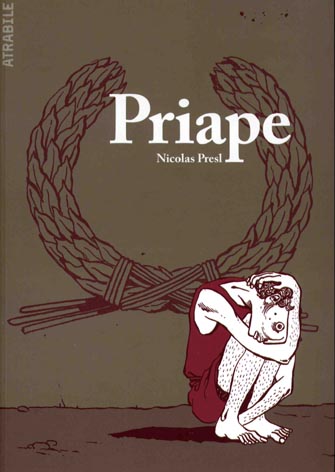
January 12, 2007
 Conversational Euro-Comics: Bart Beaty Reviews Priape, by Nicolas Presl
Conversational Euro-Comics: Bart Beaty Reviews Priape, by Nicolas Presl

 Priape
Priape (Atrabile, 2006), the first book by Nicolas Presl, is something of a strange one. A lengthy wordless graphic novel, I picked it up almost exclusively because of my faith in the publisher. The Swiss-based
Atrabile introduced me to the work of
Frederik Peeters,
Alex Baladi,
Cedric Manche, and
Jason (who, to be fair, had already been published in Scandinavia before he was picked up by Atrabile, and later by
Fantagraphics), so a new book from a new talent quickly caught my attention.
As its title suggests, the book tells the story of the minor Greek/Roman god,
Priapus, protector of livestock endowed with an enormous penis. Indeed, Presl's Priapus, like that in the
House of Vettii, has genitals the size of his leg. This deformity is a shame to his parents, who abandon the newborn baby. He is adopted by a family and raised as the subservient and put-upon son, a brother to a bullying and war-like sibling (Ares? The lack of dialog also means a lack of character names). When enough is enough, Priapus leaves for the city, where he is taken in by an adoring older man who, in one of the book's best set pieces, introduces Priapus to the scholarly set, and, later, to the orgies. Eventually, Priapus falls in love with an older man and, this being a Greek tragedy, I will give you one guess as to the identity of that man. Needless to say, it all ends in horrifying bloodshed, violence, and with the rending of garments and the blinding of our hero. The ancient Greeks rarely did things in half measures.

The most distinctive element of
Priape is certainly Presl's choice of figure drawings. A former stone carver turned comics artists, he relies heavily -- indeed, almost exclusively, on profile compositions of his characters. Moreover, his figures' faces are drawn in an exaggerated style with bugged-out eyes, and generally elongated heads. In this way, his characterization seems like a cross between the aesthetics of 6th century BC and
Pablo Picasso. His use of unusual panel framing also contributes a slightly disorienting feeling, as if not everything were entirely right with the world. And, of course, it's not.
If there is a drawback to this approach it is that the exaggerated figures can occasionally blend in with each other. A key transition at the orgy, for instance, took a moment to register because of a lack of strong differentiation among the characters. The lack of a consistent visual register is very much a deliberate theme in the book -- characters literally morph at various times into animals -- but it can also be a stumbling block and the very basic level of comprehension.

Ultimately, I liked
Priape mostly for the fact that it exposed me to an interesting new artist. As a stand-alone book, it is only a moderate success.
Priape is good at what it does, but what it tries to do is not entirely satisfying because of its reliance on a fairly predictable narrative and a lack of strong characterization. The weaknesses of the story are not entirely compensated by the strength of the art. In a way, it's one of the stranger comics coming-out stories that you're likely to read, but not necessarily the most memorable. Priapus was a minor god, and, perhaps fittingly, this is a somewhat minor work by an artist who is likely to go on to much stronger material down the road.
posted 3:36 am PST |
Permalink
Daily Blog Archives
November 2019
October 2019
September 2019
August 2019
July 2019
Full Archives


